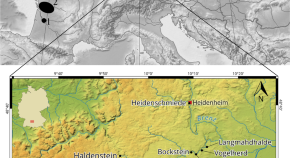
Collection
Microvertebrate Studies in Archaeological Contexts: Middle Paleolithic to early Holocene past environments
- Submission status
- Open
- Open for submission from
- 01 May 2021
- Submission deadline
- Ongoing
Editors
-
Juan Manuel López-García
My interdisciplinary background allows me to work at the interface between Earth Sciences (Paleontology) and Humanities (Prehistory-Archaeology), as shown by most of my track record in Quartile Q1 belonging to Geosciences Areas: History degree (2004, Universitat Rovira i Virgili, Tarragona) followed by a PhD degree in Prehistory at the Universitat Rovira i Virgili (URV), rewarded with Excellent Cum Laude and extraordinary departmental award (1/10/2008). The main interest during my career was poured into the fossil small mammal studies.
-
Hugues-Alexandre Blain
Currently researcher in the Department of Micropaleontology of the Institut Català de Paleoecologia Humana y Evolució Social and the Department of Prehistory of University Rovira i Virgili in Tarragona. I’m mainly engaged in the study of the amphibians and reptiles from the Iberian Plio-Pleistocene and their use as paleoecological and paleoclimatological proxy in relation with human paleoecology, and forms part of the research teams of the Sierra de Atapuerca (Burgos), Guadix-Baza Basin (Granada), Almenara-Casablanca (Castellón), Quibas (Murcia), Pinilla del Valle (Madrid), Caldes de Malavella (Girona), Azokh (Nagorno Karabakh), Guefait.
-
Sara E. Rhodes
After earning my Bachelors and Masters at the University of Toronto (Canada), I completed a doctorate of natural sciences (Dr. rer. nat) at the University of Tübingen (Germany) in 2019. My dissertation recreated the paleoenvironment of the Ach Valley, Germany, during the period between 60,000 and 35,000 cal BP when modern humans replaced Neanderthal groups in the region (Rhodes et al., 2018, 2019; Rhodes 2019; Rhodes & Conard, 2021). In 2020, I was awarded a DAAD Postdoctoral Researcher International Mobility Experience (PRIME) fellowship to conduct research at the University of Witwatersrand (South Africa) and University of Toronto (Canad
-
Ángel Blanco-Lapaz
Is the Collection Manager for Archaezoology and Archaeobotany Collections at University of Tübingen and Senckenberg Center for Human Evolution Tübingen, Baden-Württemberg, Germany
Articles (6 in this collection)
-

-
New insights in Neanderthal palaeoecology using stable oxygen isotopes preserved in small mammals as palaeoclimatic tracers in Teixoneres Cave (Moià, northeastern Iberia)
Authors (first, second and last of 8)
- M. Fernández-García
- J. M. López-García
- J. Rosell
- Content type: Original Paper
- Open Access
- Published: 16 May 2022
- Article: 106

-
Paleoclimatic and paleoenvironmental reconstructions based on the small vertebrates from the Middle Paleolithic of Hohle Fels Cave, SW Germany
Authors (first, second and last of 4)
- Elisa Luzi
- Àngel Blanco-Lapaz
- Nicholas J. Conard
- Content type: Original Paper
- Open Access
- Published: 16 May 2022
- Article: 107

-
Palaeoecological reconstructions of the Middle to Late Pleistocene occupations in the Southern Caucasus using rodent assemblages
Authors (first, second and last of 8)
- Iván Rey-Rodríguez
- Juan Manuel López-García
- Tania King
- Content type: Original Paper
- Open Access
- Published: 02 May 2022
- Article: 96

-
The last interglacial-glacial cycle in the Meuse Valley (southern Belgium) inferred from the amphibian and reptile assemblages: implications for Neanderthals and anatomically modern humans
Authors (first, second and last of 6)
- Hugues-Alexandre Blain
- Almudena Martínez Monzón
- Annelise Folie
- Content type: Original Paper
- Published: 10 December 2021
- Article: 5

-
Palimpsest of micromammal deposits in an archaeological rock shelter (Álvarez 4, Late Holocene) from northwestern Patagonia, Argentina
Authors
- Ailín A. Guillermo
- Claudia I. Montalvo
- Fernando J. Fernández
- Content type: Original Paper
- Published: 02 October 2021
- Article: 178



